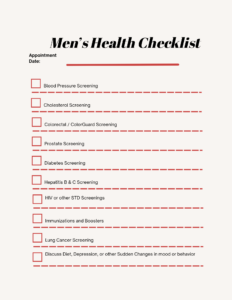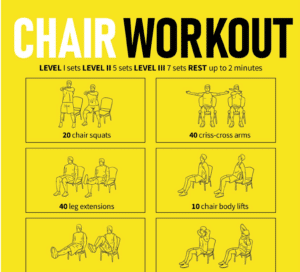
Follow Daily Nutrition Recommendations
Food manufacturers put nutrition labels on their products to empower consumers. Understanding the nutrients you get in each meal and snack ensures you’re giving your body what it needs to maintain your well-being.
The latest nutritional recommendations from the Office of Disease Prevention and Health Promotion advise that adult men should vary their caloric intake based upon their age, daily activities, and workout routines. The nutritional guidance changes for various age groups, but men between the ages of 19-30 can aim for other recommended daily nutrient intakes, such as:
- 56 grams of protein
- 20-35 grams of fat
- 6 grams of fiber
- 130 grams of carbohydrates
- 18 milligrams of iron

Talk with your doctor or health coach for personalized advice. They may recommend sticking with a lower or higher intake of these recommended nutrients based on your health history and current lifestyle.
Have a Well-Rounded Diet
Following nutritional guidelines means you eat foods containing those essential vitamins and nutrients. Reflect on your diet. Do you eat mostly processed foods and snacks? Are you confident in your ability to put together a well-rounded meal or are you unsure about your nutritional choices?

There are a lot of fad diets out there, but only long-term diet structures are successful in teaching us how to combine vegetables, proteins, healthy carbs and fats into nutritious meals. You can eat foods free of gastrointestinal irritants to reduce gas pains or uncomfortable bowel movements. Additionally, you can follow an Autoimmune Protocol Diet to reduce pain and inflammation. Alternatively, there are diets to specifically aide thyroid conditions, such as hair loss, muscle weakness, a weak immune system, and chronic fatigue.
For better health and feeling strong at any age, talk with a nutritionist or health coach when you have questions about structuring a supportive, filling daily diet. They’ll reference your health history and personal goals to create meals and snacks that work best for your body.
Schedule Preventive Health Measures
Following a healthy diet prevents getting sick as often because your body can fuel your immune system, but men can take other preventive health measures to protect their well-being. Follow the following steps to support your long-term health as much as possible.
Attend Cancer Prevention Screenings
Cancer screenings look for signs of specific developing cancers. Instead of hoping you’re doing enough to prevent cancerous growths, routine screenings will help you catch potential symptoms early enough to avoid adverse diagnoses.
Anyone can sign up for lung cancer screenings between ages 50-80 when they’re more at risk. However, if you have a history of smoking or currently smoke daily, your doctor may recommend starting screenings earlier.
Everyone’s favourite joke is no joke. Colonoscopies allow a gastroenterologist to look for cancerous growths in the colon before they develop into an untreatable condition. This procedure could also help you identify colon damage or irritation for other undiagnosed conditions like irritable bowel syndrome (IBS) and todays screenings actually start in the home!
Because they take steps to assess lymph nodes, palpating the abdomen and checking the testicles for growths you might not detect on your own, it’s important to keep your annual exam with your general practitioner. Additionally, it’s also an excellent opportunity to ask questions about your diet, exercise, caloric requirements, and to discuss the screenings we’ve already mentioned.
Print a Free Men’s Health Checklist you can take to your doctor’s visit.
Avoid Tobacco and Excess Caffeine
People often use tobacco, vaping, or drink caffeinated beverages because they think it helps their anxiety or stress, but it has been proven to exacerbate these symptoms. While filling our bodies with chemicals, caffeine interferes with the body’s ability to absorb nutrients and causes muslce spasms, increases heartburn and digestive issues, and actually promotes fatigue. Using tobacco or vaping regularly is another reason to get routine lung screenings or ask your doctor when to start them.
If you’d like to quit smoking, your doctor can recommend resources to make quitting easier on your body and increase the odds that you don’t relapse.
Drink Less Alcohol
There are numerous reasons to drink less alcohol if you’re concerned about your health. Opting for alcohol-free beverages reduces hot flashes in men and supports your liver’s health by minimizing the toxins it processes. If you experience bloating, acid reflux or constipation, sudden mood swings, strange pains in the right upper quadrant of your torso under your ribs, or if you bruise easily, detoxing your liver may help.
Moreover, stopping or reducing your alcohol consumption is an excellent place to start to improve your overall physical well-being.
Get Regular Exercise
Routine exercise is great for men and women. It strengthens your muscles, improves your blood flow and stimulates the thyroid to help you lose weight. Try easy workouts like these to increase your heart rate at least a few times weekly:
- Walk in the evenings.
- Do pushups during commercial breaks.
- Park farther away from stores to get in more steps.
- Lift grocery bags like weights while carrying them inside.
- Do squats while making dinner.
- Get up from your desk at least three times while working and do some quick exercises for 2-3 minutes.
- As you get used to exercising, you can integrate your movements into traditional workouts- like running, lifting weights or attending fitness classes. You’ll feel stronger and maintain a healthy weight by mindfully working out more often.
Discuss Your Family Health History
Your genes play a significant role in long-term health and feeling strong. They determine if you’re more likely to develop certain conditions or cancers, so idiscussing your family health history with your doctor is crucial. Even if you don’t know the exact health statuses of your siblings, parents or grandparents, starting the conversation helps them guide you in prevetative health care.
Men’s health tips feature actionable steps like exercising and getting routine screenings, but conversations are equally crucial to maintaining your well-being. Chat with your doctor and family members, if possible. The information you discover about yourself could determine the most effective ways to stay healthy.
Take Care of Your Health
Learning about men’s health measures and preventative resources is a process. Give yourself time to get into healthier habits by setting attainable goals. Research nutrients and long-term diet strategies and chat with licensed health professionals to establish a better lifestyle. You’ll be healthier, stronger, and more confident in your well-being.
Written in collaboration with Mia Barnes, Editor in Cheif on Mind + Body Magazine





















